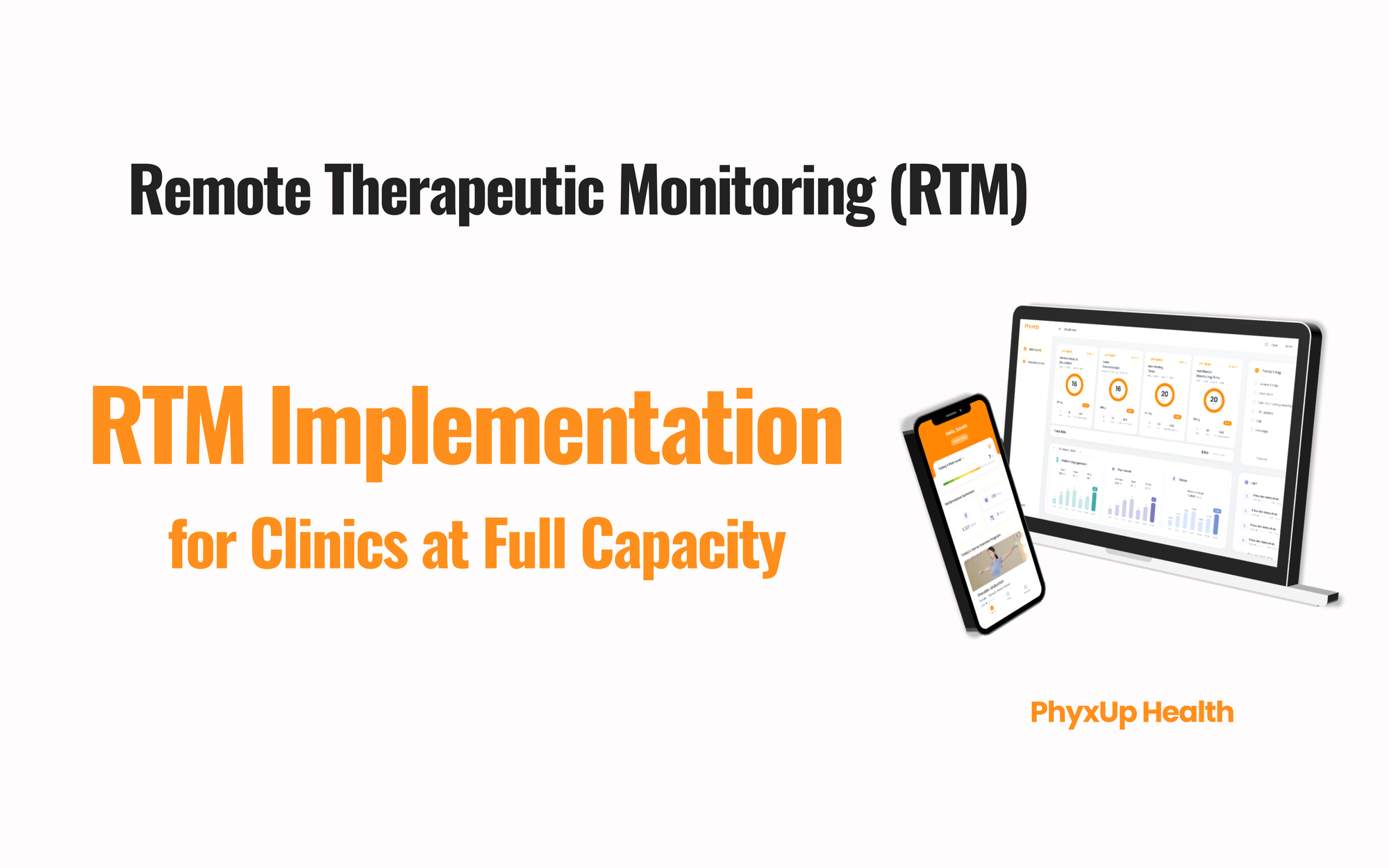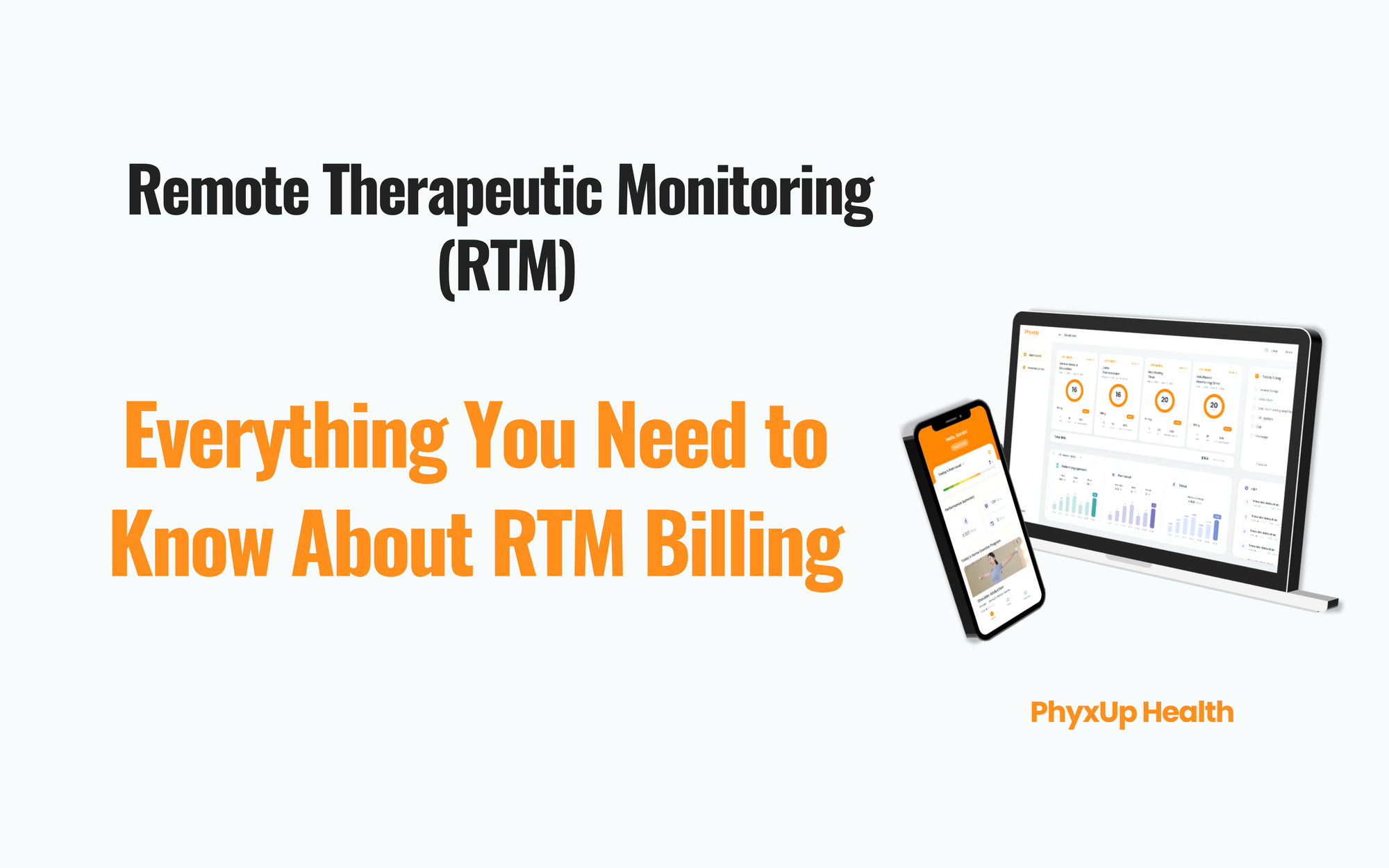How Physical Therapy Clinics Use RTM Without Extra Staff or Time

Remote Therapeutic Monitoring (RTM) is opening up a new revenue stream for outpatient physical therapy clinics, without requiring more visits, more staff, or more hours in the day.
Sounds too good to be true?
If you’ve heard of RTM but felt like your clinic didn’t have the bandwidth to make it happen, this post is for you. Let’s break down how RTM works, why it matters, and how you can implement it with zero disruption to your current workflow.
What Is Remote Therapeutic Monitoring?
Remote Therapeutic Monitoring (RTM) is a CMS-recognized service that reimburses providers for remotely tracking a patient’s musculoskeletal condition between visits using digital tools.
In 2022, CMS introduced four RTM CPT codes:
- 98975 – Initial setup and patient education
- 98977 – Remote monitoring of musculoskeletal status
- 98980 – First 20 minutes of RTM treatment management per calendar month
- 98981 – Each additional 20 minutes of RTM treatment management

RTM is commonly used to monitor:
- Post-surgical recovery (e.g., rotator cuff, TKR, ACL)
- Chronic conditions (e.g., low back pain, osteoarthritis)
- Rehabilitation progress following injury
- Adherence to home exercise programs (HEPs)
What RTM Actually Involves
Running RTM properly means more than just checking in once or twice.
To bill RTM, clinics must:
- Assign a home exercise program with digital tracking
- Monitor symptoms and patient feedback regularly
- Log time spent managing the patient remotely
- Contact the patient via phone, text, or app at least once per calendar month
- Submit documentation and claims to payers under the proper codes
It’s valuable care, but it does require structure, consistency, and clinical oversight.
For clinics already at full capacity, this often becomes the biggest roadblock.
Why Most Clinics Don’t Do RTM (Even If They Want To)
Even though many PTs agree that RTM makes sense, both clinically and financially, they often hit the same barriers:
“We don’t have anyone to handle weekly check-ins.”
“Our admin team doesn’t have time to do extra documentation.”
“Billing new codes feels risky and confusing.”
“We’re already overwhelmed with what we have.”
These concerns are valid. RTM isn’t difficult, but doing it internally requires staff time, workflows, and oversight.
This is why so many clinics delay adoption… even though they’re leaving thousands of dollars in reimbursable services on the table.
The Alternative: Fully Managed RTM Services
That’s why many clinics are turning to fully managed RTM services like PhyxUp Health—a platform built specifically for outpatient physical therapy.
Instead of assigning more work to your therapists or front desk team, the RTM care team handles the entire process:
📌 Patient onboarding
📌 HEP assignment and digital tracking
📌 Weekly symptom and adherence check-ins
📌 Clinical documentation and time tracking
📌 RTM billing and claims submission
Your team provides clinical oversight when needed, approving care plans and reviewing flagged issues, but doesn’t have to do any of the operational work.
This makes RTM a completely hands-off revenue stream.
Why Fully Managed RTM = Passive Income
In most business models, more revenue means more effort. But with PhyxUp Health’s fully managed RTM, the equation is different:
But your workload stays the same.
Because a third-party RTM care team is managing the program end-to-end, your therapists stay focused on in-person visits while your clinic benefits from:
✅ Monthly RTM reimbursement
✅ Better home exercise compliance
✅ Improved patient retention
✅ Higher engagement between visits
Here’s a breakdown:
| RTM Patients Enrolled | Estimated Monthly Revenue |
|---|---|
| 20 patients | $3,300 – $6,000 |
| 40 patients | $6,600 – $12,000 |
| 60 patients | $9,900 – $18,000 |
| 80 patients | $13,200 – $24,000 |
| 100 patients | $16,500 – $30,000 |
*Based on standard RTM codes (98975, 98977, 98980, 98981)
And remember: this income is recurring. As long as patients stay active in the program, your clinic continues to get paid, without adding sessions, staff, or complexity.
Real Clinic Example: From 0 to $12K/Month in 60 Days
One outpatient physical therapy clinic in New York had three full-time therapists and a fully booked schedule.
They didn’t have time to build a remote care workflow or train staff to handle RTM internally, but they wanted to provide better support for post-op patients recovering from rotator cuff repair and total knee replacement.
So they partnered with PhyxUp Health.
Here’s what changed:
- Their patients received structured weekly check-ins
- A remote care team monitored progress and updated HEPs as needed
- All documentation and RTM billing were handled behind the scenes
- The clinic’s staff stayed focused on in-person care
Within just 60 days, the clinic was earning an estimated $8,000 to $12,000 per month in RTM revenue, based on 40 active patients enrolled and the average reimbursement of $165–$300 per patient per month.
They didn’t hire anyone.
They didn’t change their system.
They just said yes, and let PhyxUp Health do the rest.
Additional Benefits of RTM (Beyond Revenue)
RTM isn't just about money. It also enhances the overall quality of care your clinic provides.
Improves Patient Communication
RTM offers a structured way to check in between visits, catch issues early, and keep patients on track.
Increases Accountability
Knowing someone is monitoring their progress helps patients stay consistent with their HEPs.
Supports Plan-of-Care Adherence
When patients stick to the program, they’re more likely to recover fully, leading to better outcomes and fewer drop-offs.
Gives You Insight
RTM data helps identify trends across patient populations, which can inform clinical decisions and improve your outcomes.
FAQs: What Clinic Owners Want to Know
💡 Is this legal and compliant?
Yes. RTM codes are CMS-approved and reimbursed by Medicare, BCBS, Aetna, UHC, and more. PhyxUp Health handles all documentation and billing under proper delegation.
💡 Do I need special software?
No. Most fully managed RTM providers use their own HIPAA-compliant platform and onboard your patients for you.
💡 What kinds of patients qualify?
Any patient with a musculoskeletal condition who’s assigned a HEP and is willing to interact digitally (text, app, or call).
Final Thoughts
Most physical therapy clinics want to improve outcomes, increase compliance, and get reimbursed for the work they already do between visits.
But limited staff and time make it hard to do RTM alone.
With a fully managed RTM service, you don’t have to.
✅ You stay focused on patient care
✅ PhyxUp handles the check-ins, documentation, and billing
✅ Your clinic earns recurring monthly revenue without lifting a finger
If you’ve been looking for a scalable, low-effort way to support your patients and grow your business, PhyxUp Health makes RTM simple, compliant, and profitable.
Let us do the work. You get the revenue.

